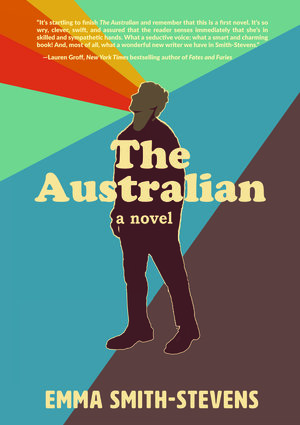Review: THE AUSTRALIAN by Emma Smith-Stevens

Review by CHASE BURKE
Like his image on the cover, the Australian—the otherwise-unnamed hero of Emma Smith-Stevens’s debut novel, which is also called The Australian—is the kind of person who looks to the sky instead of to the ground in front of him. He wanders, often quite literally, through the events of the novel, restlessly pursuing a vision of self-actualization. In an interview conducted shortly after the novel’s release, Smith-Stevens noted that she’d written the book as if “each of the novel’s scenes was a distinct section.” In doing so, she has crafted a kind of picaresque novel, one that is charming, affecting, and funny in equal measure. And while the book is not particularly concerned with the machinations of plot, it reveals itself to be a thoughtful meditation on masculinity, identity, and making a space for yourself in the world.
When we first meet the Australian in his home country, he is paying his way through college as a Superman-costumed street actor “conscious of the bulge of his cock.” After graduating he moves to New York, having “suddenly acquire[d] for the first time a distinct ambition,” one that is as American as it gets: to be rich. The Australian is, quite literally, performing an American comic-book version of masculinity: to be a rich hero.
But with time, and reality, the performance falters, and the Australian meets failure after failure, a repeated puncturing of the charmed vision initially presented to us. And where once the world felt full of endless possibility, he begins to believe that “failure has integrated itself into the fabric of his being.” Nothing, it seems, is possible.
Eventually, the novel seems to settle into a kind of redemption narrative. The Australian returns to his homeland so that he can learn something about his father, whom he never knew outside of stories he was told of his swashbuckling bravery. If he can only know more about this brave, adventurous, risk-seeking figure—the idealization of masculinity is in his genes!—he can unlock in himself the kind of potential he knows he has as a father, a husband, and a man.
But there are complications. In seeking out his origins, the Australian chooses to abandon his wife and son in New York. And what he learns in Australia does not match the story he has been told, and that he has told himself, of his lineage: he learns that his father was little more than “a boy so scared of life that he died trying to prove otherwise.” This revelation puts the Australian into a spiral, and it is in the midst of this tailspin that he finally begins to understand—and accept—himself for who he is.
It is a testament to Smith-Steven’s writing that the book’s efforts to dig into identity and masculinity are never bogged down by self-seriousness. In fact, The Australian’s strongest aspect is its levity. This is a funny and “quippy” short novel, its humor gentle but always present. Smith-Stevens’s sentences are full of sharp ironic barbs, but one never gets the feeling that she is mocking her characters. She simply points out various absurdities in worldview and the requisite criticism that comes with those views, while allowing her characters the leeway to believe what they want to believe, even if, in the case of the Australian, that is simply “to pretend to have faith” in himself.
The combination of humor and generosity is a rich one, and it allows Smith-Stevens to pack tons of additional material into throwaway lines. Her descriptions of the Australian’s world—of jobs, TV shows, movies, the culture of the day—are imbued with enough imagination to warrant their own short stories (or novels). Instead, they are used here as elaborate, humorous detail, as meaningful color. Take this description of a pop star’s attempts at a career comeback, which describes a character’s music while also indicting the absurdly appropriative nature of American culture at large:
The pop star’s only work since her trip to South America and the onset of her affliction, [the song “4ever True”] remains memorable to the Australian—in it, the pop star’s vocals are layered over the mating calls of Peruvian katydids. The song was supposed to result in the first of three Amazon-inspired music videos, altogether called Holy Treenity, but it fizzled out the moment it hit the airwaves.
The world, then, that the Australian wanders—be it New York or his own home country—never feels drab or devoid of life. On the contrary, a reader feels that the book, already working in the picaresque form, could go anywhere, could describe anything.
But Smith-Stevens’s last (and best) trick is in undermining the narrative conceits we would expect from a story like this. One could imagine the romantic-comedy film version of the Australian’s story ending with happy reunions, kisses, and fireworks in Times Square. Instead, what we get is bittersweet and complicated. For a book that revels in the ironies of masculinity, America, and celebrity, this kind of ending is unexpected—and welcomed.
But it’s not unsurprising, because Emma Smith-Stevens knows the story she wants to tell. She has written an excellent novel, one that crackles with wit and wisdom. By the book’s end, the Australian is a little more mature, and a little more aware of the reality of the world, and a little more accepting of the fact that “everything unlikely is, by definition, possible.”